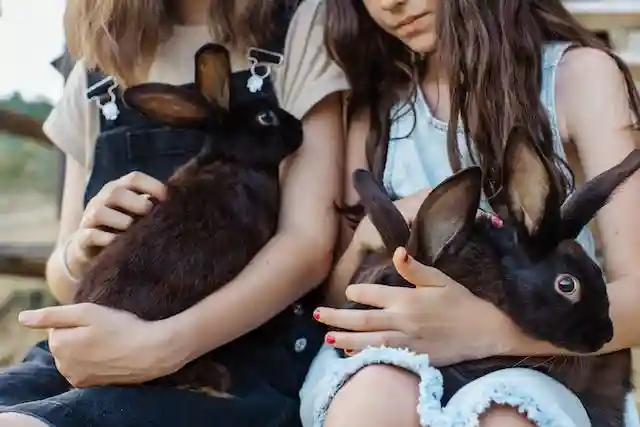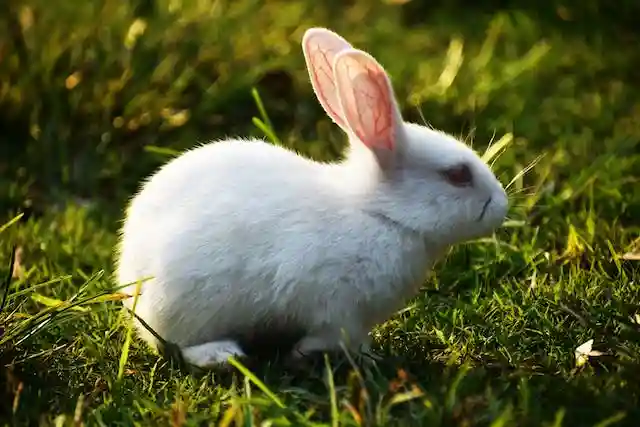At PetsCareWorld, we are committed to providing the most comprehensive and informative content. In this article, we delve into the intriguing world of bunnies, exploring their behavior, habits, and the ever-fascinating question: do bunnies bite? Our mission is to equip you with the knowledge needed to ensure the health and happiness of your furry friends.
Understanding Bunny Behavior

Bunnies, also known as rabbits, are endearing creatures that have charmed their way into countless households. To comprehend whether these adorable companions bite, it is essential to first understand their behavior.
Inquisitive by Nature: Rabbits are naturally curious beings. They use their mouths to explore the world around them, often nibbling on objects to investigate their texture and taste. This behavior may occasionally extend to their human companions, but it is rarely aggressive.
Communication through Nipping: Bunnies communicate with each other and with humans through gentle nipping or nibbling. This is their way of expressing affection, seeking attention, or even playfully interacting with you. It is important to differentiate between this harmless nibbling and true aggression.
Do Bunnies Bite?

The burning question on every bunny owner’s mind is, do bunnies bite? The answer is not as straightforward as a simple yes or no.
Nipping versus Biting
Bunnies, as mentioned earlier, use their mouths to communicate. When they do nip, it is usually a form of communication rather than aggression. However, in rare cases, rabbits may bite if they feel threatened or cornered.
Aggression Triggers

Understanding what might trigger aggression in your bunny is key to preventing bites. Common triggers include:
- Loud Noises: Sudden loud noises can startle rabbits and cause them to react defensively.
- Handling Stress: Improper handling or excessive stress during grooming or medical procedures can lead to biting.
- Territorial Behavior: Rabbits are territorial animals, and if they feel their space is invaded, they may resort to biting as a defense mechanism.
How to Prevent Bunny Bites

Preventing bunny bites is essential for both your safety and the well-being of your pet. Here are some tips to help you maintain a harmonious relationship with your furry friend.
Socialization and Bonding: Spending quality time with your rabbit, petting, and interacting with them gently will help build trust and minimize the chances of aggressive behavior.

Proper Handling: When picking up your bunny, make sure to support their hindquarters. This reduces stress and discomfort, decreasing the likelihood of them biting out of fear.
Bunny-Proofing Your Space: Creating a safe environment for your rabbit is important. Remove any potential hazards and provide plenty of toys to keep them entertained.
Medical Matters for Rabbits: Consult a Veterinarian

If your bunny’s biting behavior persists, it may be due to an underlying health issue. Consulting a veterinarian who specializes in exotic pets is advisable. Keeping your rabbit healthy involves understanding their specific medical needs:
- Vaccinations: Ensure your rabbit receives appropriate vaccinations, such as those for rabbit hemorrhagic disease (RHD) and myxomatosis. Consult your veterinarian for a vaccination schedule.
- Spaying and Neutering: Spaying or neutering your rabbit is essential to prevent unwanted litters and reduce hormonal aggression. It can also have health benefits.
- Dental Care: Rabbits are prone to dental issues due to their continuously growing teeth. Regular check-ups with a rabbit-savvy vet can help detect and address dental problems early.
- Diet: A balanced diet is vital for your rabbit’s health. Provide unlimited access to fresh hay, high-quality rabbit pellets, and fresh vegetables. Avoid high-sugar and high-calcium foods.
- Parasite Control: Protect your rabbit from external and internal parasites like fleas, mites, and worms. Consult your vet for appropriate preventive measures.
- Emergency Preparedness: Be aware of common health emergencies in rabbits, such as gastrointestinal stasis or bloat. Recognizing the signs and having an emergency plan in place can be life-saving.
Understanding your rabbit’s instincts, fostering positive relationships, and addressing medical matters are vital aspects of responsible rabbit ownership. Regular veterinary care, proper nutrition, and a safe and stimulating environment will ensure your beloved rabbit lives a happy and healthy life as part of your family.
Do rabbit bites hurt?

Rabbit bites can indeed hurt, but the severity of the pain depends on various factors. It’s essential to understand that rabbits, for the most part, do not bite aggressively or harm. Instead, their bites are typically a form of communication or a reaction to specific situations.
Here are some factors to consider regarding the pain associated with rabbit bites:
- Force of the Bite: The force of a rabbit’s bite can vary. In most cases, their bites are gentle nips or nibbles, which may cause minimal pain or discomfort. However, if a rabbit feels threatened or extremely stressed, their bite can be harder and more painful.
- Location of the Bite: Where a rabbit bites you also influence the level of discomfort. Bites on sensitive areas like fingers or hands may hurt more than bites on less sensitive areas.
- Individual Sensitivity: Pain perception is subjective and can vary from person to person. Some individuals may find rabbit bites more painful than others based on their pain threshold.
- Reason for the Bite: Understanding why the rabbit is biting is crucial. If it’s due to fear, stress, or feeling cornered, the bite may be more painful than if it’s a playful nibble or a gentle communication nib.
- Infection Risk: Regardless of the initial pain level, any animal bite, including a rabbit’s, carries the risk of infection. Rabbit mouths can harbor bacteria, so it’s essential to clean and disinfect a rabbit bite wound promptly to prevent infection.
To minimize the risk of painful rabbit bites, it’s essential to socialize with your rabbit, build trust, and learn to interpret their body language and behavior cues. Proper handling techniques and creating a safe, stress-free environment for your pet can also go a long way in reducing the likelihood of being bitten. If you have concerns about your rabbit’s behavior or bite incidents, consulting a veterinarian or an experienced rabbit owner can provide valuable insights and guidance.
Do rabbits like to be held?

Whether or not rabbits enjoy being held largely depends on the individual rabbit’s temperament, their past experiences with handling, and how they are accustomed to human interaction. It’s essential to recognize that rabbits are prey animals by nature, so their responses to being held can vary.
Here are some considerations regarding whether rabbits like to be held:
- Individual Personality: Just like people, rabbits have distinct personalities. Some rabbits are more outgoing, sociable, and tolerant of handling, while others may be more reserved or nervous. The level of comfort with being held can vary greatly from one rabbit to another.
- Socialization: Rabbits that are properly socialized from a young age and have positive interactions with humans are more likely to tolerate and even enjoy being held. Handling them gently and regularly can help build trust and make them more comfortable with human contact.
- Handling Techniques: How a rabbit is held can significantly impact their comfort level. It’s crucial to support their body properly and avoid restraining them too tightly. When held correctly, some rabbits may relax and even seem to enjoy the attention.
- Duration: Short and gentle handling sessions are generally better received than extended periods of holding. Rabbits may become restless or anxious if held for too long, so it’s essential to respect their limits.
- Body Language: Pay attention to your rabbit’s body language. If they show signs of stress or discomfort, such as trying to wriggle free, thumping their hind legs, or flattening their ears, it’s a sign that they may not be enjoying the experience.
- Positive Associations: Associating being held with positive experiences, such as treats or gentle petting, can help rabbits develop a more positive attitude toward being held.
While some rabbits do enjoy being held and may even seek out human interaction, others may be more reserved or cautious. It’s essential to respect your rabbit’s preferences and comfort level. If you want to hold your rabbit, start with short sessions, be gentle and supportive, and pay attention to their cues. Over time, many rabbits can become more accustomed to and even enjoy being held, but it’s crucial to approach it with patience and sensitivity to their individual needs and boundaries.
Do pet rabbits bite hard?

Pet rabbits generally do not bite hard, and their bites are typically not intended to cause harm. However, the force of a rabbit’s bite can vary depending on several factors:
- Temperament: The individual temperament of the rabbit plays a significant role. Some rabbits are naturally more gentle and docile, while others may be more skittish or nervous. A rabbit with a calm and trusting disposition is less likely to bite with force.
- Socialization: How well a rabbit has been socialized with humans from a young age can affect their behavior. Rabbits that have positive interactions with people from an early age tend to be more comfortable with being handled and are less likely to bite.
- Reason for Biting: It’s important to understand the context of the bite. Most of the time, when rabbits “bite,” it’s more of a nibble or a gentle nip. They may do this as a form of communication, to get attention, or out of curiosity. True aggressive biting from a pet rabbit is relatively rare and is usually triggered by fear, stress, or discomfort.
- Handling Techniques: The way a rabbit is held or handled can influence its response. If a rabbit is held too tightly or in a way that makes it feel trapped, it may respond with a harder bite. Using proper handling techniques, such as supporting their hindquarters and allowing them to feel secure, can help prevent forceful biting.
- Health and Pain: If a rabbit is in pain or discomfort due to an injury or illness, it may react by biting more forcefully than usual. It’s essential to consider their health when assessing their behavior.
In most cases, pet rabbits may gently nibble or nip as a form of communication or to explore their surroundings. Rabbit owners need to differentiate between these gentle nips and true aggression. Consult a veterinarian or an experienced rabbit behavior specialist to determine the underlying cause and address aggressive behavior if a rabbit is biting hard or displaying it.
Proper socialization, gentle handling, and creating a stress-free environment are key to fostering a positive relationship with a pet rabbit and minimizing the chances of forceful biting.
Natural instincts, Rabbit relationships, Medical matters
Understanding instincts, rabbit relationships, and medical matters is essential for responsible rabbit ownership. In this comprehensive guide, we will delve into these aspects to help you provide the best care for your pet rabbit.
Natural Instincts of Rabbits

Rabbits are prey animals with several instincts that shape their behavior:
- Burrowing: Rabbits are natural burrowers. In the wild, they dig tunnels to create safe, underground nests. Providing a suitable digging area in their enclosure can help satisfy this instinct.
- Chewing: Rabbits have ever-growing teeth that need to be worn down through chewing. Supplying them with safe chew toys and fresh hay can help prevent dental problems.
- Grooming: Rabbits are meticulous groomers. They will groom themselves and, if bonded, their rabbit companions. Regular grooming helps maintain their fur and build social bonds.
- Hiding: Rabbits instinctively seek hiding spots when they feel threatened or scared. Providing a hideaway in their enclosure gives them a sense of security.
Rabbit Relationships
Understanding rabbit relationships is crucial for fostering social bonds and preventing conflicts:
- Bonding: Rabbits are social animals that often form strong bonds with other rabbits. If you have a single rabbit, consider getting a compatible companion to prevent loneliness.
- Hierarchy: In bonded pairs, rabbits establish a hierarchy. This is normal and may involve some chasing or minor disputes. As long as there is no aggressive behavior, it’s usually harmless.
- Introductions: Introducing new rabbits requires care. Gradual introductions in a neutral space can reduce stress and potential aggression. Supervise their interactions until they are comfortable with each other.
Pet Rabbit: Preventing aggression

Preventing aggression in pet rabbits is crucial for the well-being of both the rabbit and its owner. While rabbits are generally gentle creatures, they can display aggressive behavior under certain circumstances. Here are some tips to help prevent aggression in pet rabbits:
Proper Socialization from a Young Age: Socialize your rabbit with humans and other pets from an early age. This helps them become accustomed to different stimuli and reduces fear-based aggression.
Respect Their Space: Rabbits are territorial animals, and invading their space can trigger aggression. Ensure they have a safe and secure area to call their own, like a hutch or pen.
Gentle Handling: Handle your rabbit gently and correctly. Support their hindquarters when picking them up to prevent discomfort or fear.
Avoid sudden movements or loud noises when interacting with your rabbit.
Positive Reinforcement: Use positive reinforcement techniques to reward good behavior. Treats, petting, and verbal praise can help reinforce positive interactions.
Regular Exercise: Allow your rabbit plenty of exercise time outside their enclosure. This helps them release energy and reduces pent-up frustration that can lead to aggression.
Spaying or Neutering: Consider spaying or neutering your rabbit, as this can reduce hormonal aggression and territorial behavior, especially in males.
Monitor Their Health: Regularly check your rabbit’s health. Pain or discomfort due to illness or injury can lead to aggression as a defensive response.
Understand Body Language: Learn to interpret your rabbit’s body language. Signs of aggression may include lunging, growling, biting, or thumping their hind legs. If you notice these signs, give your rabbit space.
Introduce New Pets Gradually: If you’re introducing a new pet to your rabbit, do it gradually and under supervision. Ensure the introduction is positive to prevent territorial aggression.
Consult with a Veterinarian or Behaviorist: If your rabbit displays aggressive behavior that you can’t manage, consult with a veterinarian or a rabbit behavior specialist. They can help identify the underlying cause and provide guidance.
Remember that every rabbit is unique, and their behavior can vary. Being patient, understanding, and consistent in your interactions with your pet rabbit can go a long way in preventing aggression and fostering a loving and harmonious relationship.
Conclusion
In conclusion, the question, “Do bunnies bite?” does not have a one-size-fits-all answer. While rabbits may nip as a form of communication, true biting is relatively rare and often linked to specific triggers. By understanding your bunny’s behavior and taking preventive measures, you can foster a loving and secure bond with your furry companion.
At PetsCareWorld, we are dedicated to delivering valuable information to pet owners.
Frequently Asked Questions (FAQs)
-
Do bunnies bite frequently?
Bunnies typically don’t bite frequently. Their bites are often gentle nips used for communication or exploration.
-
Can bunny bites hurt?
While bunny bites are usually not very painful, they can vary in force. Understanding their behavior can help minimize any discomfort.
-
Why might a bunny bite?
Bunnies may bite if they feel threatened, scared, or stressed. Understanding their triggers can help prevent biting incidents.
-
Do all bunny breeds have the same biting tendencies?
Biting tendencies can vary among bunny breeds and individual rabbits. Some breeds may be more prone to nipping, while others are generally gentle.
-
How can I prevent bunny bites?
Preventing bunny bites involves socializing, gentle handling, and creating a stress-free environment. Understanding their body language is key to avoiding potential bites.





Leave a Comment
You must be logged in to post a comment.